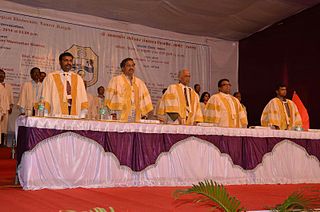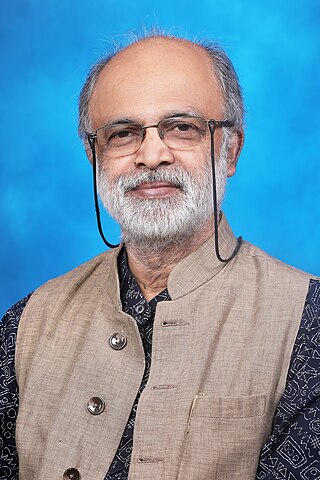
Man Mohan Sharma, is an Indian chemical engineer. He was educated at Jodhpur, Mumbai, and Cambridge. At age 27, he was appointed Professor of Chemical Engineering in the Institute of Chemical Technology, Mumbai. He later went on to become the Director of UDCT, the first chemical engineering professor to do so from UDCT.

Mambillikalathil Govind Kumar Menon also known as M. G. K. Menon, was a physicist and policy maker from India. He had a prominent role in the development of science and technology in India over four decades. One of his most important contributions was nurturing the Tata Institute of Fundamental Research, Mumbai, which his mentor Homi J. Bhabha founded in 1945.

Anil Kakodkar, is an Indian nuclear physicist and mechanical engineer. He was the chairman of the Atomic Energy Commission of India and the Secretary to the Government of India, he was the Director of the Bhabha Atomic Research Centre, Trombay from 1996 to 2000. He was awarded the Padma Vibhushan, India's second highest civilian honour, on 26 January 2009.

Institute of Chemical Technology (ICT) is a public deemed university in Mumbai, India. The institute also has campuses at Bhubaneswar, Odisha and Jalna,. It is focused on training and research in the fields of chemical engineering, chemical technology, and pharmaceutical sciences. It was established in 1933 and was granted deemed university status in 2008, making it the only state-funded deemed university in India. On 12 February 2018 it was given the status of Category 1 institute with graded autonomy by the Ministry of Human Resource Development and the University Grants Commission (India). It is also an institute with a special status as mentioned in SECTION IV of the Report of the Empowered Expert Committee in 2018.
Palle Rama Rao FREng is an Indian scientist noted for his contribution to the field of Physical and Mechanical Metallurgy. He has collaborated and conducted research activities for over dozen universities and associations all over India and abroad. He has been honoured with the titles of Padma Vibhushan in 2011 by president of India for his contributions to scientific community. He is acting as the chairman, Governing Council, International Advanced Research Centre for Powder Metallurgy & New Materials (ARCI), Hyderabad.
Shashikumar Madhusudan Chitre FNA, FASc, FNASc, FRAS was an Indian mathematician and astrophysicist, known for his research in Astronomy and Astrophysics. The Government of India honored him, in 2012, with Padma Bhushan, the third highest civilian award, for his services to the sciences.
Suhas Pandurang Sukhatme is an Indian scientist, teacher, author and a former Chairman of the Atomic Energy Regulatory Board of the Government of India, known for his expertise in heat transfer and energy technologies. He was honoured by the Government of India, in 2001, with the fourth highest Indian civilian award of Padma Shri.
Chaitanyamoy Ganguly is an Indian nuclear scientist and a former head of the Nuclear Fuel Cycle and Materials Section of the International Atomic Energy Agency (IAEA), credited with many innovations in the field of nuclear material science. He was honored by the government of India in 2002, with the fourth-highest Indian civilian award of Padma Shri.

Valangiman Subramanian Ramamurthy is an Indian nuclear physicist with a broad range of contributions from basic research to Science and Engineering administration.Prof.Ramamurthy started his career in Bhabha Atomic Research Centre, Mumbai in the year 1963. He made important research contributions in the area of nuclear fission, medium energy heavy ion reactions, statistical and thermodynamic properties of nuclei and low energy accelerator applications. During the period 1995-2006, Prof.Ramamurthy was fully involved in Science administration as Secretary to Government of India, Department of Science and Technology, (DST), New Delhi.Other important assignments held by him include Director, Institute of Physics, Bhubaneswar, (1989-1995), DAE Homi Bhabha Chair in the Inter-University Accelerator Centre, New Delhi (2006-2010), and Director of the National Institute of Advanced Studies, Bengaluru (2009-2014). He is a former chairman of the Recruitment and Assessment Board of the Council of Scientific and Industrial Research and has served as a member of the design team of the first Indian nuclear experiment in Pokhran on 18 May 1974. The Government of India awarded him the third highest Indian civilian honour of Padma Bhushan in 2005.
Satinder Kumar Sikka was an Indian nuclear condensed matter physicist, crystallographer and a former Scientific Secretary to the Principal Scientific Advisor of the Government of India. He was known to have played a crucial role, along with Raja Ramanna, Rajagopala Chidambaram and Basanti Dulal Nagchaudhuri, in the design and development of a Hydrogen Bomb by India, which was tested at the Pokhran Test Range in May 1998, under the code name, Operation Shakthi. He was also involved in the Smiling Buddha tests, conducted in 1974. He was awarded the fourth highest civilian award of the Padma Shri, by the Government of India, in 1999.
Bhalchandra Madhav Udgaonkar, popularly as B.M. Udgaonkar, was an Indian theoretical particle physicist, scientist, educationist and the co-editor of A Nuclear-Weapon-Free World: Desirable?, Feasible?. His contributions have been reported in the development of Homi Bhabha Centre for Science Education (HBCSE), Institute of Physics, Bhubaneswar and Marathi Vidnyan Parishad (MaViPa). An alumnus of the Raja Shivaji Vidyalaya, he is a member of the Institute of Advanced Study, USA, a scientists' community, and a former president of the Marathi Vidnyan Parishad. He is the author of several books and has contributed content to books written by others. The Government of India awarded him the third highest civilian honour of the Padma Bhushan, in 1985, for his contributions to science and technology.
Laxmangudi Krishnamurthy Doraiswamy (1927–2012) was an Indian-American chemical engineer, author and academic, known for his contributions in developing Organic synthesis engineering as a modern science discipline. Chemical Engineering journal of McGraw Hill listed him among the 10 most distinguished chemical engineers in the world in 1988. He was the author of nine texts in chemical engineering, including Organic Synthesis Engineering, a 2001 publication which is known to have introduced the topic as a definitive scientific stream and Heterogeneous reactions: Analysis, Examples, and Reactor Design, reportedly the first comprehensive text in chemical engineering.

Ganapati Dadasaheb Yadav is an Indian chemical engineer, inventor and academic, known for his research on nanomaterials, gas absorption with chemical reaction and phase transfer catalysis. He served as the vice chancellor of the Institute of Chemical Technology, Mumbai from 2009 until November 2019. He is currently the Emeritus Professor of Eminence at ICT Mumbai.
Rajinder Kumar is an Indian chemical engineer and a former professor at the Indian Institute of Science. He is known for his studies on multiphase phenomena and is an elected fellow of the Indian National Science Academy, Indian Academy of Sciences, and the Indian National Academy of Engineering. The Council of Scientific and Industrial Research, the apex agency of the Government of India for scientific research, awarded him the Shanti Swarup Bhatnagar Prize for Science and Technology, one of the highest Indian science awards for his contributions to Engineering Sciences in 1976. He received the third highest Indian civilian award of the Padma Bhushan in 2003. He is also a recipient of Om Prakash Bhasin Award and the VASVIK Industrial Research Award.
Devang Vipin Khakhar is an Indian chemical engineer and the former director of the Indian Institute of Technology Bombay. He is known for his pioneering researches on polymerization and is an elected fellow of all the three major Indian science academies viz. Indian Academy of Sciences, Indian National Science Academy and National Academy of Sciences, India as well as Indian National Academy of Engineering. The Council of Scientific and Industrial Research, the apex agency of the Government of India for scientific research, awarded him the Shanti Swarup Bhatnagar Prize for Science and Technology, one of the highest Indian science awards for his contributions to Engineering Sciences in 1997.
Krishnaswami Venkataraman FNA, FASc, FNASc, FRSC, popularly known as KV, was an Indian organic chemist and the first Indian director at National Chemical Laboratory and University Department of Chemical Technology, Mumbai (UDCT). He was known for the demonstration of an organic chemical reaction involving 2-acetoxyacetophenones which later came to be known as the Baker–Venkataraman rearrangement and for his contributions in developing NCL into one of the leading research centres in organic chemistry. He was an elected fellow of several science academies which included the Royal Society of Chemistry, Academy of Sciences Leopoldina, USSR Academy of Sciences, Prussian Academy of Sciences, Polish Academy of Sciences, Indian Academy of Sciences, and the Indian National Science Academy. The Government of India awarded him the Padma Bhushan, the third highest Indian civilian award, in 1961.
Chokkanathapuram Venkataraman Sundaram was an Indian chemical metallurgist, best known for the commissioning of the Fast Breeder Test Reactor at Kalpakkam. He was the director of the Indira Gandhi Centre for Atomic Research (IGCAR). He was a recipient of the Sanjay Gandhi Award for Science and Technology as well as the National Metallurgists Day Award and an elected fellow of the Indian National Science Academy, the Indian Academy of Sciences and the Indian National Academy of Engineering. The Government of India awarded him the Padma Bhushan, the third highest civilian award, in 1986.
Kinshuk Dasgupta is an Indian research scientist at Bhabha Atomic Research Centre. He also holds a professorship at the Homi Bhabha National Institute. He earned his Bachelor in Engineering from Jadavpur University in metallurgy and PhD from the Institute of Chemical Technology, Mumbai in chemical engineering. His research expertise mainly includes work on carbon based nano materials and composite synthesis of the use of nano materials.
Amol Arvindrao Kulkarni is an Indian research scientist at National Chemical Laboratory, Pune. He earned his PhD from the Institute of Chemical Technology, Mumbai in chemical engineering. His research expertise includes design and development of microreactors.

Aniruddha Bhalchandra Pandit is an Indian chemical engineer, inventor and academic, known for his fundamental and commercial research on cavitational reactors, design of multiphase reactors, bubble dynamics. He is the vice chancellor of the Institute of Chemical Technology, Mumbai since 2019, succeeding G. D. Yadav.







